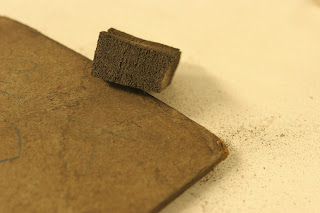The collection came to us in poor condition. Housed in nothing but an old cardboard box, the loose sheets, sketchbooks and catalogues had accumulated a thick layer of dirt making it difficult to see the drawings. Even the most careful handling meant that we were transferring dirt to other parts of the collection and all over ourselves! Cleaning and re-housing is all part of the process of ensuring that collections are stable once they enter LHSA, and that they are able to be used in future. We blogged about this kind of work in October when we accessioned a large number of index cards, so we're used to getting our hands dirty to help preserve the collections!
The collection before treatment
Each item was carefully surface cleaned and the items re-housed in high quality folders and boxes. This was an incredibly time consuming task, undertaken in stages over the last five months.
We got through a lot of chemical sponges (background) to surface clean the sketchbooks (foreground)
But the hard work has been worth it – the drawings have been revealed and we have discovered that the many of them were designed or commissioned by medical practitioners whose papers we already hold in the Archive!
It’s been a team effort to improve the condition of this fascinating collection: Ruth surface cleaned all the papers, Mariko (one of our previous conservation volunteers) repaired two of the larger sheets, and Fiona and Sandi (our current volunteers) produced custom-made folders.
The collection after treatment
The conservation treatment carried out so far will make this material more accessible, but there’s still a lot more to do. Laura has assigned a collection reference number (GD47), and our archive volunteers will go on to catalogue each item. In the future, GD47 will return to the conservation studio for the second phase of treatment – to repair physical damage to the paper sheets.






.jpg)





